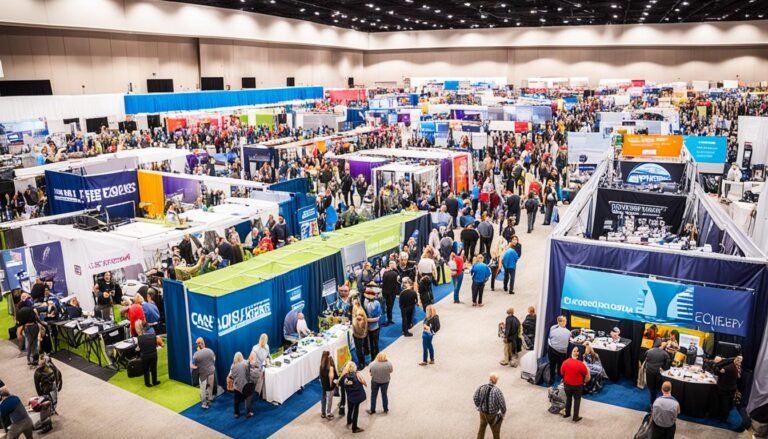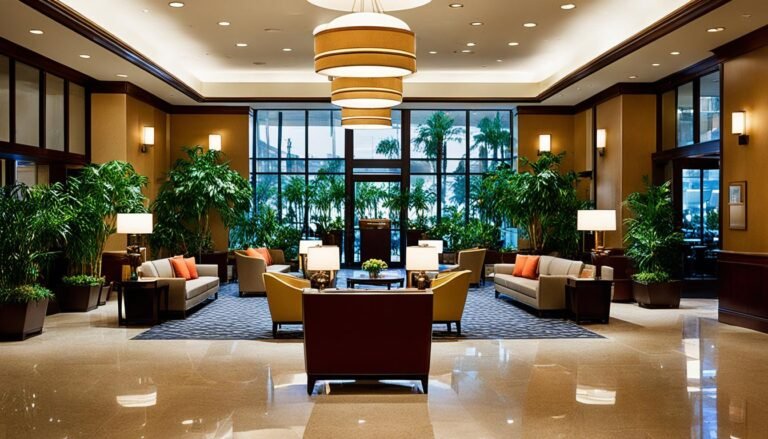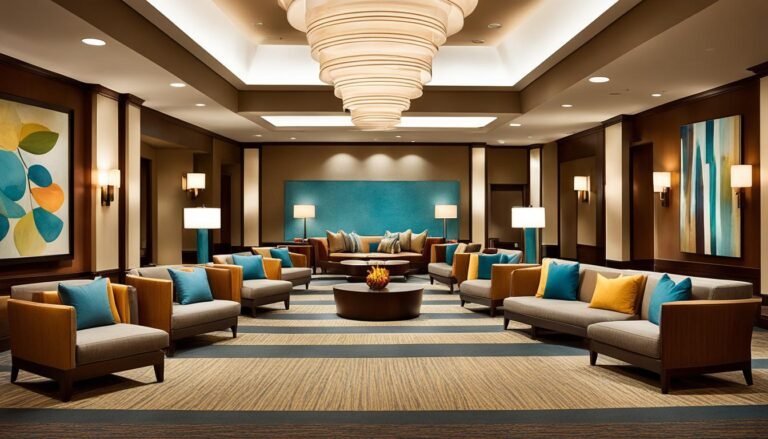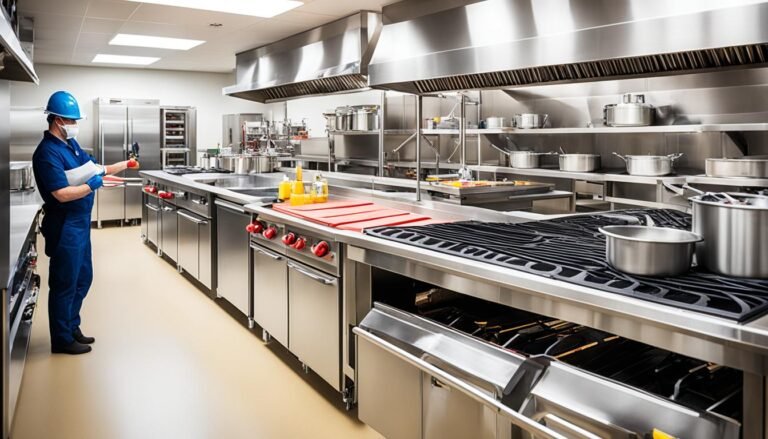Emerging Hospitality Industry Trends & Innovations
Welcome to the hospitality world! Here, trends and innovations improve guest experiences every day. The industry is moving towards digital solutions and eco-friendly practices. It’s all to satisfy the changing demands of travelers.
We’re going to explore the cutting-edge trends that will define tomorrow’s hospitality.
Workforce Empowerment: Transforming Challenges into Opportunities
In the fast-changing hospitality industry, keeping and finding good staff is tough. Hotel businesses often struggle to hire and keep skilled workers. But, some smart hotel groups are turning this trouble to their advantage. They are focusing on making their workforce feel empowered.
Workforce empowerment means creating a work environment where people feel supported and can grow. It includes actions to improve their jobs and lives. This approach helps hotels make a team that’s excited to serve guests well.
Many hotels now offer more than just a paycheck to their employees. They give options for affordable places to live. This makes living near work less expensive for their staff. It’s a way to get and keep top talent who might worry about high housing costs in some areas.
Hotels are also paying higher wages to keep up with what’s fair in the industry. Good pay means workers are happier and more willing to work hard. This strategy makes sure employees are really committed to their jobs.
Another useful tool is training programs. These help hotel staff learn and grow in their careers. By investing in their people this way, hotels get workers who feel fulfilled and valued. This leads to better service for their guests.
Happy and well-trained employees help make guests’ stays great. When hotel workers are motivated and feel their work matters, everyone wins. They strive to make guests happy, which boosts the whole hotel’s reputation.
This positivity doesn’t just stay within the hotel. Happy staff often tells their friends to join the industry too. This word of mouth helps bring in more quality people to hospitality, making the field stronger.
Benefits of Workforce Empowerment:
- Attracting and retaining talented individuals
- Improved working conditions
- Enhanced job satisfaction and motivation
- Positive impact on guest experience
- Cohesive and dedicated workforce
By focusing on their workforce, the hospitality industry can beat its challenges. This means creating a strong team by offering great benefits and training. The result is better service for guests and long-term success for the hotels.
When hotel staff are happy and empowered, everyone wins. Guests have a great stay, which leads to good reviews and more business. It’s a win for everyone involved.
The key to unlocking the full potential of a hotel lies in the empowerment of its workforce. By providing attractive benefits, improved working conditions, and comprehensive training programs, hotels can build a motivated and dedicated team that delivers outstanding guest experiences. Workforce empowerment is the cornerstone of success in the hospitality industry.
Artificial Intelligence and Technology: Choosing the Best Tech to Revolutionize Hospitality
The hospitality industry leads in using technology and artificial intelligence (AI) to change how things work and make guest experiences better. Hotels are looking at new tech that makes their work smoother, efficient, and safe for guests.
Transforming the Guest Journey with Contactless Services
Because of COVID-19, contactless services like mobile check-in, digital keys, and voice-controlled rooms are very important. Mobile check-in lets guests skip the line at the front desk, making their arrival quick and easy. Digital keys on smartphones mean no more plastic keys. Voice control lets guests adjust the room’s temperature and lights without touching anything.
Ensuring Data Privacy and Cybersecurity
With more tech in hotels, keeping guest data safe is critical. They need to make sure all information is protected. Using the cloud for data storage can make things more secure and easier to access.
Optimizing Operations with Robotic Systems and Augmented Reality
Robots are changing how hotels run, especially in cleaning and helping guests. They can do simple jobs so that human staff can focus on making guests’ experiences better. Augmented reality helps with staff training and makes it fun for guests to learn and explore. For example, it can turn signs into any language or show where different places are.
Choosing the right tech is key for hotels to compete and make guests happy. AI, new tech, and mobile services can make things run better, help staff, and keep up with what travelers want now.
| AI and Technology Innovations in Hospitality | Benefits |
|---|---|
| Contactless Services | Simplify guest journey, enhance convenience, improve efficiency |
| Data Privacy and Cybersecurity | Protect guest information, prevent cyber threats |
| Robotic Systems | Optimize operations, enhance staff productivity, improve guest experiences |
| Augmented Reality | Enhance staff training, create engaging experiences, improve guest interactions |
Artificial Intelligence and technology can really change the hospitality world. They offer ways for hotels to make guest stays better, work more smoothly, and succeed in the long run. By using the best tech, hotels can make every guest’s experience special and meet their changing needs.
Culinary Experiences: Putting Experiences, Authenticity, and the Senses First
In the hospitality industry, culinary experiences have reached new heights. They aim to offer unique and memorable moments to guests. These experiences engage all the senses and leave a lasting impact.
Guests today don’t only want to eat at a nice place; they want something extra. Hotels provide a wide range of dining choices, from fancy dinners to fun and interactive meals. This variety makes food a journey full of new tastes, textures, and sights.
“These creative dining concepts take guests to exciting new places,” says Chef Lydia Thomas. “They mix extravagant displays with interactive cooking to engage all senses.”
Multi-sensory Environments
Restaurants now use tech and design to create memorable dining spaces. Ambient light, special music, and stunning visuals all play a part. These elements draw diners into the experience.
Some places use technology like projection mapping to change their spaces visually. And scent diffusers can add a new layer by matching smells to the food. This makes the dining experience not just about taste but about all the senses.
Diverse Dining Options
Hotels are now offering more choices to meet various food needs and tastes. They have everything from traditional dishes to new and healthy options. This variety means there’s something for everyone.
Cooking classes and workshops at hotels are also getting popular. They give guests the chance to learn from chefs and get hands-on with cooking. These experiences can teach new skills and a love for cooking.
Healthier Children’s Menus
Children’s menus are also getting a fresh look with an eye on health. Hotels are adding nutrition to kids’ meals without losing the fun. This change aims to make food enjoyable and good for kids at the same time.
“We’re working to make meals that are both balanced and fun for kids,” says Chef Sarah Thompson. “We think this will help build a foundation for life-long healthy eating habits in children.”
Off-Premise Dining and Food Delivery
With the growing trend of off-premise dining and delivery, hotels are responding. They’re setting up ghost kitchens and virtual eateries. This lets them offer more food choices without needing more space.
Food delivery is becoming more popular, too. This way, guests can enjoy hotel-level meals at home. It’s a convenient option for those on the go or families looking for easy dining solutions.
Hotels are embracing change in the culinary world. They are focused on creating unforgettable dining experiences that touch every sense. With new ideas and a wide variety of food, they’re leading the way in making eating out an adventure.
Bars and Drinks Redefined: Adding Creativity and Design to the Drinks’ Menu
Bars in the hospitality world are entering a new age of creativity. Here, drinks aren’t just drinks; they’re pieces of art. Places are moving away from the usual bar scene. They’re turning into places that draw people in.
There’s a big focus on making bars that look great in photos. These places offer not just good looks but also fun experiences. They aim to be favorite spots for posting on social media.
Mixology, the science of mixing drinks, is big news in these new bars. Experts are getting really creative with their cocktails. They mix different flavors, textures and present them in cool ways. This makes drinking more fun, as guests get to try something new.
How drinks look is now super important too. Imagine drinks with smoke coming out or food as part of the decoration. These special touches aim to surprise. Every drink is like art you can taste.
There’s also a trend for drinks you can play a part in making. You might join a class to learn to make your own cocktails. Or maybe you’ll pick from a menu that you can interact with. It makes the drink feel more personal.
| Innovative Drinks | Immersive Atmosphere | Instagrammable Bars | Creative Cocktails | Mixology | Unique Drink Presentations | Interactive Drink Experiences |
|---|---|---|---|---|---|---|
| Unconventional flavor combinations | Visually captivating environments | Designed for social media sharing | Artistic and imaginative cocktails | Elevating the art of cocktail-making | Stunning, Instagram-worthy presentations | Guests participate in drink creation |
| Exquisite mixology techniques | Creating an immersive escape | Photogenic spaces | Pushing the boundaries of flavor | Expertly crafted flavor profiles | Surprising and delightful sensory experiences | Customized cocktail workshops |
| Inventive ingredients and garnishes | Transporting guests to new realms | Visual masterpieces | Unleashing creativity in every glass | Creating unforgettable taste sensations | Transforming drinks into works of art | Interactive tasting menus |
Bars and drinks have changed a lot. They’re not just for refreshment now. They’re a way to express creativity and have fun. With special drinks, cool places, and fun activities, bars are making the drink scene more exciting. Each bar visit is full of wonder, from trying out new cocktails to seeing amazing drink art and learning about mixology.
Contactless Solutions: Embracing Safety and Convenience
Contactless technology is now key in the hotel world, especially since the pandemic. Hotels use things like automated check-ins, mobile apps, and voice control to keep guests safe and happy. These make it easy to limit physical touch and offer a smooth time for visitors.
Your guests can check in and out without waiting at a desk. They can quickly settle into their rooms. Mobile apps let guests do everything with their phones, from booking to calling for room service. It’s simple and doesn’t need any physical contact.
“Contactless solutions streamline processes, reduce wait times, and improve overall efficiency.”
Voice control is also making stays better by letting guests manage their rooms hands-free. A quick word lets them change settings, ask for help, or get tips just for them. This high-tech feature adds a personal feel and keeps everything clean by avoiding touches on surfaces.
Hotels choose contactless options to keep guests and workers safe. These steps lower the chance of spreading illness. They also make for a more peaceful stay. Plus, hotels run better, making guests even happier with their service.
The Benefits of Contactless Solutions:
- Enhanced safety and reduced physical interactions
- Improved efficiency and streamlined processes
- Convenience for guests through mobile app access
- Hands-free control through voice-controlled hubs
- Minimized wait times and enhanced guest experience
The hotel industry keeps changing to meet guests’ new needs and keep them safe. Contactless tech is at the heart of this shift. It allows hotels to give the best, worry-free service. They do this while staying efficient and convenient for visitors.
Voice Technology for Hospitality: Seamless Voice-Activated Experiences
The hospitality industry is moving fast with tech, and voice is at the forefront. Things like Amazon Alexa and Google Assistant are now part of many hotels. They let guests do things like adjust room settings and call for services using only their voice.
This tech makes life easier for hotel visitors. They can change room settings, ask for services, and find info without touching anything. This advanced control frees up hotel staff to handle more important tasks.
One cool use is AI for concierge services. Voice assistants recommend local places and hotel features based on what the guest likes. This deepens the guest’s experience and helps hotels form a closer bond with their customers.
Benefits of Voice Technology in Hospitality:
- Hands-free control of in-room devices
- Effortless service requests and info
- Improved operational efficiency
- Enhanced guest convenience and satisfaction
- Personalized experiences for guests
“Voice technology is revolutionizing the hospitality industry by providing seamless and intuitive interactions for guests. With the power of voice assistants, hotels can deliver personalized service, hands-free control, and improved efficiency.”
Voice tech is really changing how the hospitality industry works. From controlling devices hands-free to offering tailored services, it’s all about making guests’ stays unforgettable.
Artificial Intelligence and Machine Learning: Personalized Guest Interactions
The hospitality world is changing fast, and AI and ML are at the forefront. They help make guest experiences better by offering services that fit each person’s needs. This leads to happier customers.
Now, hotels and resorts can learn a lot from all the data out there. Things like booking history, online reviews, and social media posts are analyzed. This helps businesses know what their guests want and need.
Virtual assistants are a big part of this tech shift. These smart helpers speak human language. They can recommend cool places to see and services guests might like, all based on what they like.
Imagine talking to a virtual assistant on a hotel’s website or app. It happens more often now, thanks to AI. These assistants give quick, helpful info, making a guest’s trip smoother.
Using AI and ML also helps with making smart business choices. By looking at what guests like and don’t like, hotels plan better. They can predict busy times, so they’re ready to give great service.
Personalized Service and Customer Satisfaction
Hotels can now really tailor their offerings to each guest. They welcome everyone uniquely and stock rooms with what guests enjoy. It makes a stay special.
“Personal service makes us stand out in the hospitality game. AI and ML let us know our guests and wow them with unique experiences.”
AI and ML help hotels know a lot about their guests’ likes and needs, like the best room temperature or pillow type. So, they’ve got what guests love before even being asked.
Driving Customer Loyalty
By making things personal, hotels keep people coming back. When guests feel known and cared for, they’re likely to return and tell their friends.
AI and ML also help by understanding feedback through special tech. By checking what guests say online, hotels find ways to get even better. This makes everyone enjoy their stay more.
AI and ML are changing the game in hospitality. They help know guests, offer unique services, and run operations better. The result? Unforgettable experiences and happy, loyal customers.
Hotel Sustainability: Getting Greener
Hotels are working towards a more sustainable future. They are focusing on ways to be environmentally friendly. This includes using alternative energy and eco-friendly materials.
By using sources like solar and wind, hotels can produce clean electricity. This lessens their need for non-renewable energy. It also cuts down on harmful gases that hurt the planet. So, they can run their businesses with less harm to the environment.
| Sustainable Practices | Description |
|---|---|
| Alternative energy | Integration of solar or wind power to reduce greenhouse gas emissions. |
| Eco-friendly technology | Utilization of energy-efficient appliances and systems to minimize resource consumption. |
| Energy efficiency | Implementation of energy-saving measures, such as LED lighting and smart thermostats. |
| Environmental impact reduction | Strategies to minimize waste generation and promote recycling and responsible waste management. |
Hotels are also using more green tech to lower their impact on nature. They choose energy-saving appliances like LED lights. These help save resources. Plus, they make things comfortable for guests. Cutting on energy helps in reducing their carbon output.
They’re also focusing on making less trash and handling it the right way. Through recycling, hotels lessen their mark on the planet. This shows they’re working hard to save nature for the years ahead.
Hotel sustainability goes beyond mere compliance with environmental regulations. It represents the industry’s dedication to creating a better, greener future for both guests and the planet.
By using sustainable ways from energy to tech, hotels are becoming key players in protecting our earth. They’re not just helping the environment. They’re setting examples for others in the hospitality scene. Together, they’re striving for a sustainable tomorrow.
In the pursuit of a greener future, hotels are investing in alternative energy sources, leveraging eco-friendly technology, and implementing energy-efficient measures to reduce their environmental impact. By embracing sustainable practices and prioritizing hotel sustainability, the industry takes a crucial step toward creating a more sustainable and eco-conscious hospitality sector.
Internet of Things (IoT): Smart Rooms and Energy Efficiency
The Internet of Things (IoT) is changing how hotels work. It connects devices to give guests better service. Smart rooms let guests control things like temperature and lights for a more enjoyable stay.
Guests can easily change the room’s settings to match their preferences. This could be adjusting the lights for a cozy feel or making the room brighter. IoT gives guests the power to set up the room just the way they like it.
IoT also helps hotels manage energy better. It tracks energy use in real time to find ways to save energy. This saves money and is good for the planet, which is important in today’s eco-conscious world.
Using IoT, hotels can run more smoothly. The devices and monitoring give important data to the staff. This data helps make decisions that improve how well the hotel runs and how happy the guests are.
Benefits of IoT in Hospitality:
- Personalized services: IoT lets hotels offer experiences and services that fit what each guest likes.
- Enhanced energy management: It tracks energy use to lower waste.
- Improved operational efficiency: The data helps make operations run better.
- Streamlined guest experiences: Connected devices make staying at the hotel easy and smooth.
The future of hospitality is smart and energy efficient, thanks to IoT. This technology is leading to better service for guests and less waste. As more places use IoT, the hotel industry will keep getting better and greener.
| Benefits of IoT in Hospitality | Description |
|---|---|
| Personalized services | IoT lets hotels offer experiences and services that fit what each guest likes. |
| Enhanced energy management | It tracks energy use to lower waste. |
| Improved operational efficiency | The data helps make operations run better. |
| Streamlined guest experiences | Connected devices make staying at the hotel easy and smooth. |
Virtual Reality and Augmented Reality: Immersive Guest Experiences
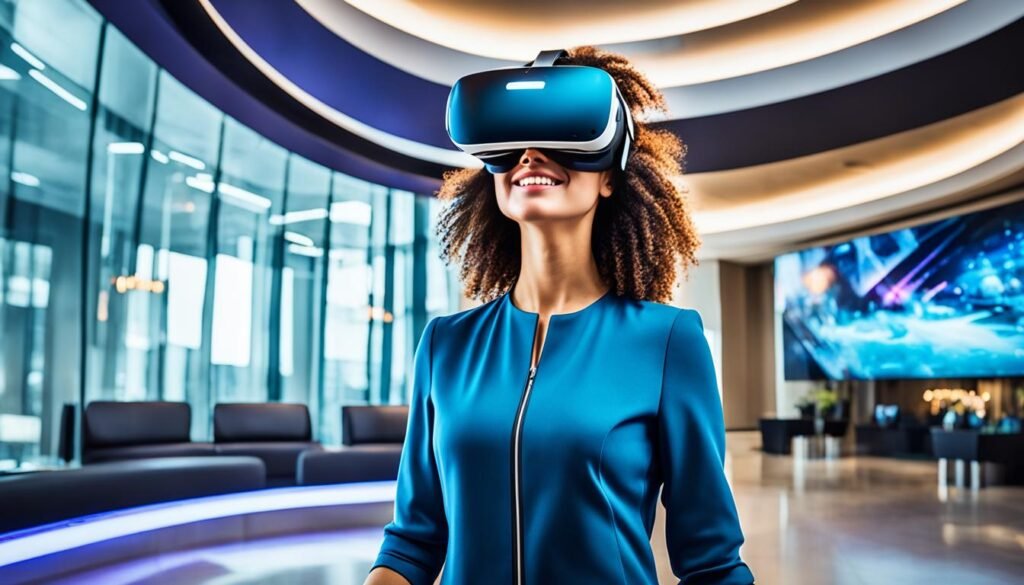
Virtual reality (VR) and augmented reality (AR) are changing how we experience hotels. These new technologies are making it possible for hotels to offer unique and captivating experiences to their guests.
VR lets visitors take a look around hotel rooms and spaces without being there. By wearing a VR headset, they can virtually visit the hotel. This makes it easier for them to choose where to stay and gets them excited about their trip.
AR, on the other hand, makes being at the hotel more fun and informative. By using their smartphones or tablets, guests can see more information about what’s around them. AR might show historical details about nearby places or translate menus into different languages. It makes the stay more interesting and easier for guests.
Hotels using VR and AR are making sure guests remember their stay. These technologies offer interactive and unforgettable ways to experience the hotel. From seeing a preview to getting helpful information, guests can really connect with the hotel.
VR and AR also make events and conferences more accessible and fun. Attendees can join from anywhere in the world. This means people can connect without actually being in the same place.
So, VR and AR are changing the hospitality world for the better. They help hotels stand out by making the whole experience more remarkable. As these tools get better, we can look forward to more amazing ways they’ll be used in the industry.
Conclusion
The hospitality industry is changing a lot. This change comes from technology, what guests like, and the focus on being greener. Businesses can use these shifts to make visitors’ stays better, work smoother, and stay competitive in today’s digital world.
By using new tech and green methods, hotels and the industry can change how guests feel during their visits. This can lead to lasting achievements.
Technology is key in this change, making ways for less touch, smarter hotels, and choices based on data. This makes things easier for guests and smoother for hotels, letting them offer top-notch services.
Going green also helps. Using clean energy, green tech, and cutting waste means less harm to the planet and lower costs for hotels. This green effort meets what more guests want and helps hotels do well for years.
FAQ
Q: How is the hospitality industry transforming?
A: The hospitality industry is changing a lot because of technology, new customer wants, and the need for green practices. These changes are making the industry better. They help businesses improve how guests feel, use things in a careful way, and work better with new technology.
Q: What improvements are being made to attract and retain staff in the hospitality industry?
A: Hotels are trying new things to keep and bring in new staff. They offer free or cheap rooms, more pay, and less work when it’s very busy. They also have more chances for workers to learn and grow. Happy staff means happy guests and draws in more good workers.
Q: How is technology revolutionizing the hospitality industry?
A: The industry is using tech and AI to change the way things work and to make guests happier. Things like checking in with your phone, using a phone to open your room, and talking to your room to control the lights make everything easier. But keeping guest info safe is a big job. Robots and cool tech glasses are also helping out.
Q: How are culinary experiences evolving in the hospitality industry?
A: Chef experiences are getting more unique and fun. Hotels now offer many ways to eat, from fancy restaurants to new fun places to try food. Cooking classes and ways for guests to help cook are also big. Grub for kids is healthier now. Places that only make food to go are also more popular.
Q: How are bars redefining the drinks’ menu in the hospitality industry?
A: Bars are now all about the new and wow factor when it comes to drinks. They make sure the bar looks amazing in pictures and real life. Fancy cocktails are big now, as are cool ways to serve drinks that get guests involved.
Q: What role do contactless solutions play in the hospitality industry?
A: Things you don’t have to touch are a must now, after the pandemic, in hotels. You can check in or out with no contact, control stuff in your room with your phone, and even ask things with your voice. These help keep you safe and make things run smoother.
Q: How is voice technology being integrated into the hospitality industry?
A: Your voice can do a lot in hotels now to make your stay special. You can ask for things, change the room, or get help without touching anything. It lets staff focus on giving top service.
Q: How is artificial intelligence and machine learning enhancing personalized guest interactions?
A: Hotels use AI and machine learning to know what you want before you ask. They offer services just for you, making you happier. Computer helpers use AI to give tips and help all through your stay.
Q: How are hotels adopting sustainable practices?
A: Green is big in hotels now. Many use the sun or wind for power to help the earth and save money. They also use tech that’s easy on the planet and doesn’t waste energy.
Q: How is the Internet of Things (IoT) transforming the hospitality industry?
A: IoT is turning hotels into smart places that do things just for you. Everything in your room is smart and can be controlled, making your stay better and greener. Smart tech also saves the hotel money.
Q: How are virtual reality (VR) and augmented reality (AR) technologies enhancing guest experiences?
A: VR and AR are making stays at hotels more fun and memorable. With VR, you can see rooms and hotels before you book. AR adds info and fun things to see around the hotel, making everything more interesting for the guest.



